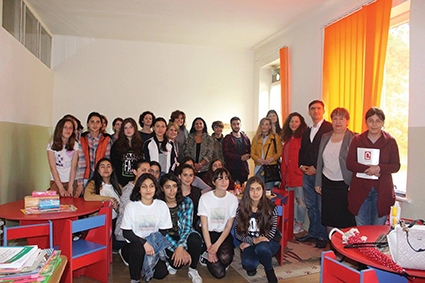Enhancing Civic Education in Georgia with the Future Generation Program
A two day media seminar organized by PH International’s Georgia office at the beautiful Lopota lake in the Kakheti region was not only a perfect weekend getaway for exhausted minds, but also turned out to be anything but ordinary. As each of us had our own views and understandings of what the Civic Education concept is about, a more in-depth look was necessary, as was meeting the people who are actually behind putting it into practice and trying to move it forward.
PH International was founded in 1985 for educational and cultural exchange between the countries of former Soviet Union and USA. Today, the organization sees its mission as building strong communities by fostering civic engagement.
The media seminar was held within the framework of PH International Georgia’s ‘Future Generation’ (Momavlis Taoba) program, which operates with financial assistance of USAID and is implemented in collaboration with the Center for Training and Consultancy, Civics Teachers’ Forum and 10 regional partner NGOs, and which is run in 480 schools nationwide in all the regions of the country. The Future Generation program's goal is to strengthen and achieve greater civic engagement among Georgian youth, while at the same time enhancing the role of civic society “by expanding and institutionalizing secondary school civics education curricula and practical applications”.
Our first meeting at the Napareuli Public School, where we met the students and their extremely motivated and enthusiastic teacher Natalia Beriashvili, was just the right illustration for the Future Generation program, implemented in a total of forty schools across the Kakheti region. Students of the Napareuli Public School debriefed us on their numerous activities, uniting 21 students from grades 9 to 12 in the civic club ‘Anabechdi’ with projects like ‘Civic Awareness for Active Citizenship’, which include defending women and children’s rights, helping socially disadvantged children by collecting and bringing them clothes, organizing an event against tobacco smoking, preparing information leaflets on AIDS, organizing an Earth Day Week and a global warming awareness campaign, and creating a resource room for fellow students with special needs. The group has also petitioned the local government authorities to equip the school with ramps and new toilets. And the government has responded, with promises to fulfil the request by September. Meanwhile, Napareuli School has no central heating, a problem that still needs to be solved.
As the teachers told us, the children are very motivated to study civic education, which is a relatively new subject for Georgian schools, and are now eagerly willing to show what they’ve learned and accomplished. It was noted that although the subject is now taught in schools, often the material is rather dry, and that’s where additional resources like books and manuals published within the Momavlis Taoba program come in. “These books helped students come up with their own initiatives, identify problems and plan activities to raise public awareness on the topics they chose, deciding who to adress with the issue,” Beriashvili said. “The local authorities are always trying to assist students to put their initiatives forward as it’s hard to refuse children!” “Through civic education, not only students but teachers are also learning, discovering, and getting to know that this country is ours - we share the responsibility and doing what needs to be done is entirely on us,” she concluded.
Back at the Lopota Lake resort, Berdia Natsvlishvili, PH International Georgia Director; Marina Ushveridze, Chief of Party, Momavlis Taoba program; Mariam Chikobava, from the National Curriculum Programs Department at the Ministry of Education and Science of Georgia; and Nino Beselia, Civic Education Expert, made detailed presentations on the civic education trends in Georgia.
“Civic Education has been taught as a mandatory subject in Georgian schools for 10 years already,” Ushveridze said. “If a country wants to develop democracy, it needs Civic Education. Iindividuals should learn how to engage and be a part of a decision-making process: that is the model and concept on which Civic Education is built on”.
In order to teach Civic Education properly, there are three essential components needed: a qualified teacher, a good textbook and practical exercises, Ushveridze told us. Every topic is taught with theoretical and practical parts, with cases offered in relation to a certain topic, and problems that are identified are then addressed through the various students’ projects carried out in schools. Almost 1,500 teachers were trained across Georgia within the USAID-funded civic education projects. “And over 500 solutions have already been implemented by different bodies as a result of issues identified by students through the project,” Ushveridze stated.
“Civic Education is a priority for us,” Chikobava said in her presentation of the country’s national plan for education. “Civic Education is the belief that a person can be in charge of change in a society,” she added. She went on to talk about the challenges Civic Education teachers encountered when the subject was first introduced in schools as a subject some ten years ago. Civic Education is now taught in the ninth and tenth grades, it is also added to the curriculum of third and fourth grades and “Citizenship” will be taught in grades six, seven, and eight as an independent subject.
“The key concept of Civic Education is the development of political culture,” said Nino Beselia, going on to discuss the broader understanding of the notion and its elements - political and legislative literacy, social and cultural literacy, economic, global and European literacy. She also explained the methods of Civic Education teaching and its ground principles such as discussions and debates.
The last part of the seminar was focused on the issues of the important role media can play in advocating Civic Education in Georgia, and further recommendations were discussed and exchanged among the participants and organizers of the event.
Nino Gugunishvili












